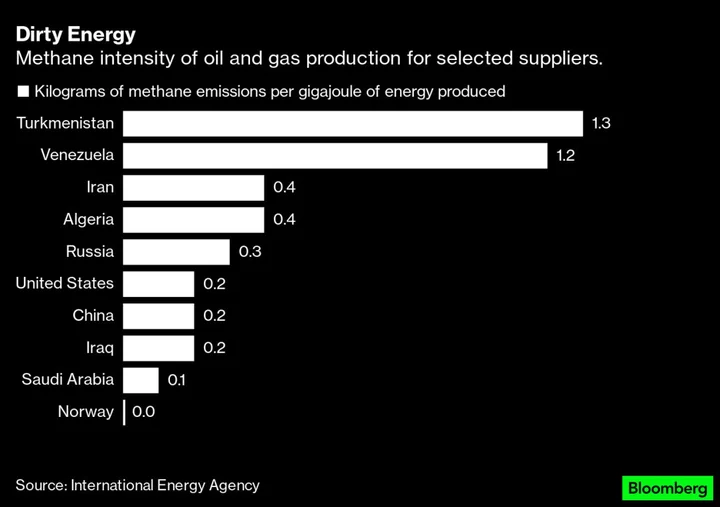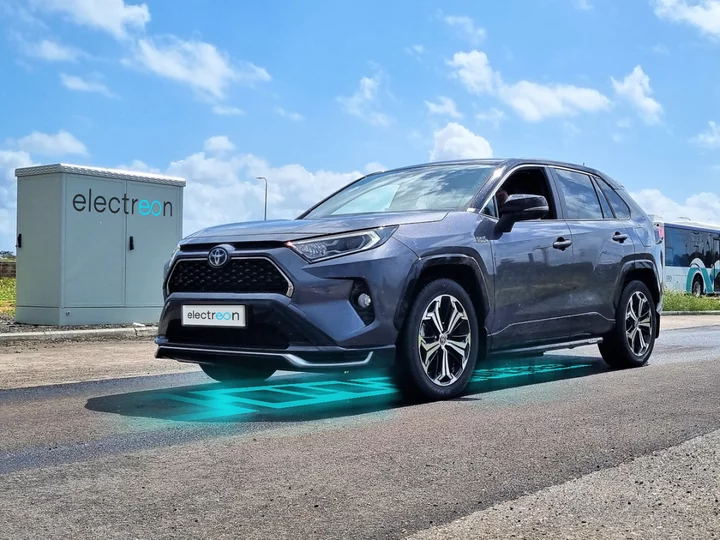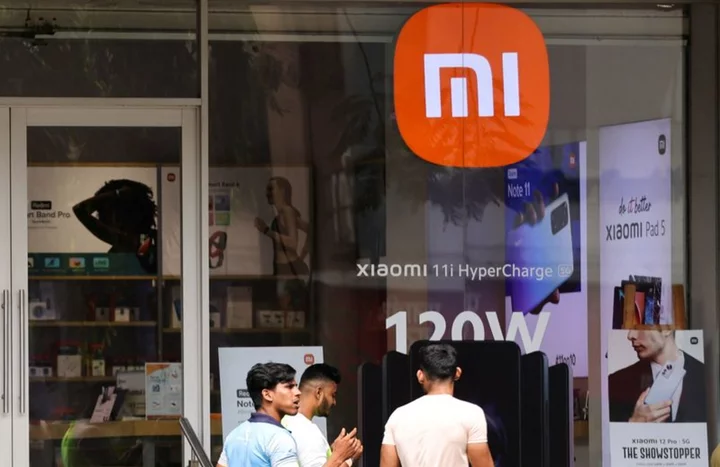
Turkmenistan in Talks With US to Tackle Giant Methane Leaks
American officials are negotiating a deal to help Turkmenistan curb its vast methane emissions, potentially sealing a major
2023-05-31 23:15

It is possible to survive the 'euthanasia roller coaster' says the man who designed it
Roller coasters are synonymous with a fun and exhilarating time at a theme park - but one artist has designed an "Euthanasia Coaster" that is specifically intended to kill its passengers. Julijonas Urbonasis is the man behind the 2010 project which has been described as a thought experiment or conceptual art. The "hypothetic death machine in the form of a roller coaster, engineered to humanely – with elegance and euphoria – take the life of a human being," according to his website. Sign up to our free Indy100 weekly newsletter How it works is that the sheer speed of the roller coaster along with number of loops would result in "oxygen deficiency in the brain," which would ultimately kill those who are on board the ride. So it appears, there's no chance of surviving the ride if you're on it. @criminologyandcoffee Would you ride the Euthanasia Coaster? #euthanasiacoaster #julijonasurbonas #rollercoaster However, there may be a way, according to Urbonas - with the Lithuanian artist explaining that it requires sporting some anti-gravity gear. "A possible usage is the 'hacked' thrill ride, which was suggested to me by an aeronautic engineer who happened to visit the coaster's scale model during an exhibition," he told LadBible back in 2021. "She said, 'Your machine could be hacked, you know.' "After my confusion, she explained, 'Using anti-g trousers that prevent pilots from blackout and fainting, I believe I would survive the ride and turn it into the most extreme thrill ride.'" While a scale model of the ride was built, according to Snopes but building the roller coaster in real life is not the aim for Urbonas - instead, the purpose of the design is "to convince the public that it can be built." "I have quite the list of people who would like to be scientific objects if the project would advance towards realisation. Most of them are elderly from the US. But I don’t want to go this far," Urbonas said in a 2018 interview with Arterritory Have your say in our news democracy. Click the upvote icon at the top of the page to help raise this article through the indy100 rankings.
2023-05-31 22:52

AI boom triples valuation of Lightmatter, US startup using light for computing
By Jane Lanhee Lee OAKLAND, California Lightmatter, a Boston-based startup using light for AI computing, said on Wednesday
2023-05-31 22:20

Why Are Hyperlinks Blue?
Unpacking the reason hyperlinks are blue requires dipping into early internet history.
2023-05-31 22:18

Electric car drives for 100 hours non-stop on futuristic road
An electric car has driven nearly 2,000km (1,250 miles) without stopping to charge as part of a demonstration of an electric road that wirelessly charges vehicles as they drive. Israeli startup Electreon claims the achievement is a new world record for the longest time and distance ever driven non-stop by a passenger electric vehicle (EV), taking just over 100 hours to cover 1,942 kilometres. The stunt was completed using a specially adapted Toyota RAV4, which drove in circles around a track fitted with Electreon’s Wireless Electric Road technology. The startup claims its tech can solve some of the fundamental challenges facing widespread EV adoption, including range anxiety, slow charge times and battery size. “The objective of this 100-hour non-stop driving rally was to demonstrate the unlimited technical potential of Wireless Electric Road technology to power EVs to drive indefinitely with a minimal battery,” said Reuven Rivlin, Electreon’s honorary president. “This is yet another clear signal that our Wireless Electric Road technology is ready for large-scale commercial projects globally.” The five-day drive involved 56 different drivers, with the vehicle only pausing momentarily to switch between drivers. Electreon plans to develop its wireless charging technology for vehicles alongside Toyota, having signed an agreement with the Japanese automotive giant in March. “This partnership will make wireless charging accessible to a diverse and wide range of drivers, and will demonstrate the many benefits of wireless charging as a cost-effective, clean solution for charging EVs, as well as a catalyst in reducing EVs’ carbon footprint,” Electreon chief executive Oren Ezer said at the time. Top-of-the-range electric vehicles in production currently have a range of just over 500km, though some prototypes have already passed the 1,000km mark. Last year, an electric Mercedes drove from Germany to the UK on a single charge, covering more than 1,200km. The Vision EQXX completed the record-breaking journey in just 15 hours, using a battery that has the same capacity as a Tesla Model S. The state-of-the-art is unlikely to ever go into mass production due to the costs of making it, however recent advances in battery technology could see the range of commercial electric vehicles rise significantly in the near future. A China-based battery startup announced earlier this month that it was aiming to become the first company in the world to mass produce electric vehicle batteries with a range of 1,000km thanks to an innovative lithium-manganese-iron-phosphate design. Other companies are also working on electrified roads for wireless or conductive charging, with Sweden unveiling plans to build around 3,000km of electric road by 2045. Read More Scientists break world record for solar power window material Electric car range set to double with first production of breakthrough battery Opinion: The real reason companies are warning that AI is as bad as nuclear war US and China ‘intertwined like conjoined twins,’ says Musk Huge ‘plume’ seen coming out of nearby moon that could support alien life
2023-05-31 21:25

For the few women who sit atop S&P 500 companies, thinner paychecks as median compensation slips
Last year was a mixed bag pay-wise for the women who run companies in the S&P 500 -- compensation increased for more than half of them, but the median pay package fell 6%
2023-05-31 20:23

'Metal Gear' creator Hideo Kojima 'not involved' in Metal Gear 3 remake
Hideo Kojima has no involvement in the upcoming remake.
2023-05-31 20:21

‘I feel lost’ – AI pioneer speaks out as experts warn it could wipe out humanity
One of the “godfathers” of artificial intelligence (AI) has said he feels “lost” as experts warned the technology could lead to the extinction of humanity. Professor Yoshua Bengio told the BBC that all companies building AI products should be registered and people working on the technology should have ethical training. It comes after dozens of experts put their name to a letter organised by the Centre for AI Safety, which warned that the technology could wipe out humanity and the risks should be treated with the same urgency as pandemics or nuclear war. Prof Bengio said: “It is challenging, emotionally speaking, for people who are inside (the AI sector). It's exactly like climate change. We've put a lot of carbon in the atmosphere. And it would be better if we hadn't, but let's see what we can do now Professor Yoshua Bengio “You could say I feel lost. But you have to keep going and you have to engage, discuss, encourage others to think with you.” Senior bosses at companies such as Google DeepMind and Anthropic signed the letter along with another pioneer of AI, Geoffrey Hinton, who resigned from his job at Google earlier this month, saying that in the wrong hands, AI could be used to to harm people and spell the end of humanity. Experts had already been warning that the technology could take jobs from humans, but the new statement warns of a deeper concern, saying AI could be used to develop new chemical weapons and enhance aerial combat. AI apps such as Midjourney and ChatGPT have gone viral on social media sites, with users posting fake images of celebrities and politicians, and students using ChatGPT and other “language learning models” to generate university-grade essays. But AI can also perform life-saving tasks, such as algorithms analysing medical images like X-rays, scans and ultrasounds, helping doctors to identify and diagnose diseases such as cancer and heart conditions more accurately and quickly. Last week Prime Minister Rishi Sunak spoke about the importance of ensuring the right “guard rails” are in place to protect against potential dangers, ranging from disinformation and national security to “existential threats”, while also driving innovation. He retweeted the Centre for AI Safety’s statement on Wednesday, adding: “The government is looking very carefully at this. Last week I stressed to AI companies the importance of putting guardrails in place so development is safe and secure. But we need to work together. That’s why I raised it at the @G7 and will do so again when I visit the US.” Prof Bengio told the BBC all companies building powerful AI products should be registered. “Governments need to track what they’re doing, they need to be able to audit them, and that’s just the minimum thing we do for any other sector like building aeroplanes or cars or pharmaceuticals,” he said. “We also need the people who are close to these systems to have a kind of certification… we need ethical training here. Computer scientists don’t usually get that, by the way.” Prof Bengio said of AI’s current state: “It’s never too late to improve. “It’s exactly like climate change. We’ve put a lot of carbon in the atmosphere. And it would be better if we hadn’t, but let’s see what we can do now.” We don't quite know how to understand the absolute consequences of this technology Professor Sir Nigel Shadbolt Oxford University expert Sir Nigel Shadbolt, chairman of the London-based Open Data Institute, told the BBC: “We have a huge amount of AI around us right now, which has become almost ubiquitous and unremarked. There’s software on our phones that recognise our voices, the ability to recognise faces. “Actually, if we think about it, we recognise there are ethical dilemmas in just the use of those technologies. I think what’s different now though, with the so-called generative AI, things like ChatGPT, is that this is a system which can be specialised from the general to many, many particular tasks and the engineering is in some sense ahead of the science. “We don’t quite know how to understand the absolute consequences of this technology, we all have in common a recognition that we need to innovate responsibly, that we need to think about the ethnical dimension, the values that these systems embody. “We have to understand that AI is a huge force for good. We have to appreciate, not the very worst, (but) there are lots of existential challenges we face… our technologies are on a par with other things that might cut us short, whether it’s climate or other challenges we face. “But it seems to me that if we do the thinking now, in advance, if we do take the steps that people like Yoshua is arguing for, that’s a good first step, it’s very good that we’ve got the field coming together to understand that this is a powerful technology that has a dark and a light side, it has a yin and a yang, and we need lots of voices in that debate.” Read More Charity boss speaks out over ‘traumatic’ encounter with royal aide Ukraine war’s heaviest fight rages in east - follow live Cabinet approves Irish involvement in cyber-threat network Trust and ethics considerations ‘have come too late’ on AI technology Mitigating ‘extinction’ from AI should be ‘global priority’, experts say
2023-05-31 19:29

India to launch electronics repair pilot project
BENGALURU India is launching a pilot project aimed at stimulating its electronics repair outsourcing industry by relaxing some
2023-05-31 19:23

EU tech chief calls for voluntary AI code of conduct within months
By Philip Blenkinsop LULEA, Sweden The United States and European Union should push the artificial intelligence (AI) industry
2023-05-31 19:15

Soros Firm Wrestles With the Scope 3 Conundrum
Just a piddling 5% of US companies report their Scope 3 greenhouse gas emissions. Unlike those tied directly
2023-05-31 18:28

British consortium to invest $9 billion in Indonesia mining, EV batteries, minister says
JAKARTA A British consortium that includes mining giant Glencore will invest about $9 billion in Indonesia's mining and
2023-05-31 17:53
